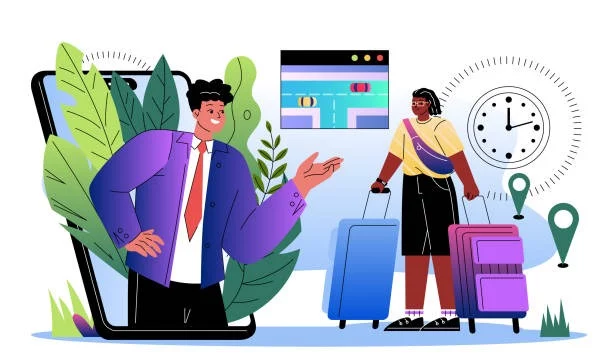In 2025, Gen Z travelers are transforming hospitality experiences globally, and their preferences are influencing the future of hotel bookings. With travel logistics rooted in instant-gratification demands, smart travel tools powered by AI are increasingly being utilized by this generation. One of the most groundbreaking advancements is the emergence of Virtual Assistant for Hotel Bookings and Reservations, which has become the go-to travel concierge for digitally-savvy users.
The Digital Native Generation
Born between 1997 and 2012, Gen Z is the first generation to grow up in the digital age. Unlike the earlier generation, millennials, who grew up in an analog world, watched the world change into a digital one. With the shift to digital, smartphones, apps, and instant connectivity became a commonplace. Each facet of day-to-day functions, travel included, was expected to be effortless and tailored to individual needs.
Recent reports from the travel industry indicate that more than 70% of Gen Z travelers favor self-service interfaces over interacting with a human agent when it comes to making hotel reservations. Even more intriguing is the fact that more than 60% of them trust AI services more than traditional booking agents in offering current room availability and competitive pricing. This increasing dependence on technology has contributed to the popularity of virtual assistants tailored for hospitality services.
Immediate Response and Real-Time Assistance
One of the driving factors that draws Gen Z to Virtual Assistant for Hotel Booking and Reservations is the responsiveness and immediate availability offered by these systems. Because these AI tools have access to hotel records alongside global travel databases, customers can check for room availability, compare prices, peruse through offered amenities, and even make payments in mere seconds.
Consider a spontaneous weekend trip for a Gen Z traveler. Instead of spending hours navigating multiple websites, making phone calls to hotels, or waiting in chatbot queues, all they have to do is tell their virtual assistant, “Book a pet-friendly hotel in Austin under $150 a night with a gym.” Within seconds, the assistant displays tailored options along with reviews and loyalty rewards if relevant.
This swift form of communication caters to the Gen Z demographic’s instant attention span. Unlike static booking websites and mobile applications that require some form of filtering or sifting through options, virtual assistants eliminate friction, decision fatigue, and save time.
Personalization is Key
Gen Z travelers want services and products tailored specially for them. Their virtual assistant’s personalization features mitigate the chances of poor customer experience by tailoring their suggestions to individual traveler preferences, value systems, and lifestyle routines. The virtual assistant provides personalized hotel recommendations based on prior bookings, social media activity, and browsing history due to underlying AI mechanisms.
These AI-powered assistants can recall dietary restrictions, the preferable time for check-ins, room temperature settings, and even favored brands. Hence, the Express Virtual Assistant morphs from merely a travel booking assistant into a reliable digital travel aide. AI systems that ‘understand’ users better encourage platform loyalty from travelers. A sense of brand fidelity forms once trust builds through technology catering to previously stated preferences.
An example of such loyalty would be users receiving messages like, “This weekend, there’s a discounted boutique room at your favorite Chicago hotel. Would you like me to book it?” Such proactive personalization strengthens emotional connections with users improving satisfaction and driving repeat usage.
Seamless Integration with Lifestyle Apps
Gen Z functions within larger interconnected frameworks. Their digital lives operate in unison, including Spotify playlists, Instagram stories, and Google Calendar alerts. Virtual assistants that work seamlessly with arrangements, digital wallets, social platforms, and travel aggregators become essential.
An Express Virtual Assistant that has the capability to both book a hotel as well as alert users about pool rules for access several hours prior to the scheduled check-in makes remarkable contributions. These virtual assistants reduce the process from planning to check-in, giving the users a holistic travel experience that is devoid of stress.
Multilingual and Culturally Aware Interfaces
Gen Z is the most culturally mobile and diverse of all the previous generations. Attending school overseas, going to international music festivals, or even taking part in volunteer programs, this generation needs solutions that are beyond language and borders.
Equipped with multilingual capabilities, contemporary Virtual Assistants for Hotel Bookings and Reservations enable users to locate and reserve hotels globally, irrespective of the local language. Moreover, they comprehend cultural nuances like local tipping etiquette or safety recommendations specific to the region, which is highly valued by Gen Z travelers seeking genuine and secure travel experiences.
Sustainability and Ethical Choices
The availability of sustainable travel options is equally important in shaping Gen Z’s preferences for virtual assistants. Many AI-based hotel booking assistants now include filters for eco-certified hotels, locally owned establishments, or properties with minimal environmental footprints.
Without going through hundreds of reviews or scrolling endlessly through webpages, virtual assistants enable Gen Z to book travel in accordance with their ethical beliefs. These assistants not only prioritize hotels that are solar powered or serve plant-based meals, but also empower their users to make conscious travel decisions that are aligned with their values.
Safety and Contactless Experiences Post-Pandemic
Even if the effects of COVID-19 have lessened by the year 2025, the pandemic continues to shape the ways travelers, especially Gen Z, evaluate safety. Minimization of contact through booking systems, remote check-in and out systems, as well as limited face-to-face interaction, is now commonplace. Through virtual assistants, accessing touch-free services, confirming sanitation protocols, as well as receiving alerts on local health regulations becomes seamless.
In addition, many members of Generation Z travelers prefer encrypted, AI-enabled systems that safeguard their privacy. They would rather avoid dealing with hotel personnel or putting their information onto an unfamiliar online form. The Express Virtual Assistant offers secure transactions along with biometric verifications and two-factor authentication which safeguards users while allowing them to feel in command.
24/7 Availability: No More Waiting on Hold
No one relishes sitting on hold. For young people, value speed and independence, waiting for a customer service representative to answer is out of the question. Virtual assistants address this problem by eliminating the wait time entirely.
Travelers can access full booking capabilities, alter their bookings, ask questions about services, or submit complaints at any time, even at 2 a.m. or on public holidays. This type of trust builds reliance and positions virtual assistants as a superior option to traditional counterparts.
The Future of Travel Belongs to Smart Assistants
The enabling technologies of travel virtual assistants continue to evolve, including natural language processing, machine learning, and travel APIs. By 2025 these assistants will be able to not only make hotel reservations, but also anticipate disruptions, provide associated risk coverage, arrange transport to and from the hotel, and even recommend weather-appropriate local activities based on user sentiment.
The ecosystem of smart assistants aligns perfectly with Gen Z expectations, particularly for convenience, control, personalization, and the ethics of a brand.
Final Thoughts
The transformation of the hotel sector stems not only from the rapid growth of technology, but also from the enthusiasm of Gen Z travelers. With their strong inclination towards AI-driven personalized interfaces, like the Virtual Assistant for Hotel Bookings and Reservations and Express Virtual Assistant, the interaction paradigm between hotels and guests is changing dramatically.
Virtual assistants offer speed, personalization, safety, and sustainability, all packaged in a seamless, digitally integrated experience. These factors combined solidify the idea that Gen Z travelers will not settle for anything other than what has become the new standard.
With smart assistant adoption, hotel and travel agencies have the best opportunity to cultivate Gen Z’s allegiance and trust. Those who choose to ignore these innovations will leave themselves vulnerable to rapidly evolving digital advancements.

Lexy Summer is a talented writer with a deep passion for the art of language and storytelling. With a background in editing and content creation, Lexy has honed her skills in crafting clear, engaging, and grammatically flawless writing.



